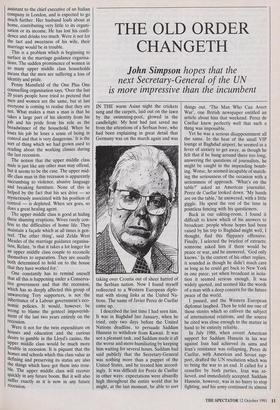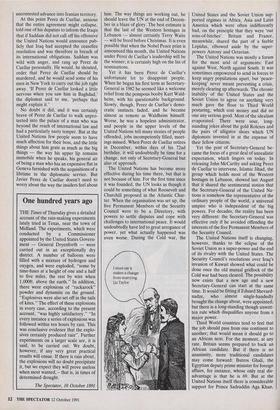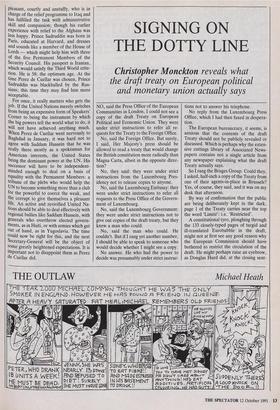THE OLD ORDER CHANGETH
next Secretary-General of the UN is more impressive than the incumbent
IN THE warm Asian night the crickets sang and the carpets, laid out on the lawn by the swimming-pool, glowed in the candlelight. My host had just saved me from the attentions of a Serbian bore, who had been explaining in great detail that Germany was on the march again and was taking over Croatia out of sheer hatred of the Serbian nation. Now I found myself redirected to a Western European diplo- mat with strong links at the United Na- tions. The name of Javier Perez de Cuellar came up.
I described the last time I had seen him. It was in Baghdad last January, when he tried, only two days before the United Nations deadline, to persuade Saddam Hussein to withdraw from Kuwait. It was not a pleasant task, and Saddam made it all the worse and more humiliating by keeping him waiting for several hours. Saddam had said publicly that the Secretary-General was nothing more than a puppet of the United States, and he treated him accord- ingly. It was difficult for Perez de Cuellar in other ways: expectations were absurdly high throughout the entire world that he might, at the last moment, be able to sort things out. 'The Man Who Can Avert War', one British newspaper entitled an article about him that weekend. Perez de Cuellar knew perfectly well that such a thing was impossible.
Yet he was a serious disappointment all the same. In the heat of the small VIP lounge at Baghdad airport, he seemed in a fever of anxiety to get away, as though he felt that if he hung around there too long, answering the questions of journalists, he might be caught in the impending bomb- ing. Worse, he seemed incapable of match- ing the seriousness of the occasion with a seriousness of approach. 'What's on the table?' asked an American journalist. Perez de Cuellar looked down. 'My hands are on the table,' he answered, with a little giggle. He spent the rest of the time in pointless fencing with his questioners.
Back in our editing-room, I found it difficult to know which of his answers to broadcast: people whose hopes had been raised by his trip to Baghdad might well, I thought, find this flippancy offensive. Finally, I selected the briefest of extracts: someone asked him if there would be peace or war, and he answered, 'God only knows.' In the context of his other replies, it sounded as though he didn't much care as long as he could get back to New York in one piece; yet when broadcast in isola- tion it seemed serious enough. It was widely quoted, and seemed like the words of a man with a deep concern for the future peace of the world.
I paused, and the Western European diplomat laughed. Then he told me one of those stories which so enliven the subject of international relations; and the source he cited was close enough to the matter in hand to be entirely reliable.
In July 1988, when covert American support for Saddam Hussein in his war against Iran had achieved its aims and Iran's resistance was collapsing, Perez de Cuellar, with American and Soviet sup- port, drafted the UN resolution which was to bring the war to an end. It called for a ceasefire by both parties. Iran was re- lieved, and immediately accepted. Saddam Hussein, however, was in no hurry to stop fighting, and his army continued its almost uncontested advance into Iranian territory.
At this point Perez de Cuellar, anxious that the entire agreement might collapse, told one of his deputies to inform the Iraqis that if Saddam did not call off his offensive the United Nations would announce pub- licly that Iraq had accepted the ceasefire resolution and was therefore in breach of its international obligations. Saddam was wild with anger, and rang up Perez de Cuellar personally. He would, he shouted, order that Perez de Cuellar should be murdered, and he would send some of his men in New York to carry out the job right away. 'If Perez de Cuellar looked a little nervous when you saw him in Baghdad,' the diplomat said to me, 'perhaps that might explain it.'
No doubt it did, and it was certainly brave of Perez de Cuellar to walk unpro- tected into the palace of a man who was beyond the reach of international law and had a particularly nasty temper. But at the United Nations few people seem to have much affection for their boss, and the little things about him grate as much as the big things — the way his upper lip remains immobile when he speaks, his general air of being a man who has an expensive flat in Geneva furnished with the acquisitions of a lifetime in the diplomatic service. But Javier Perez de Cuellar doesn't need to worry about the way the insiders feel about him. The way things are working out, he should leave the UN at the end of Decem- ber in a blaze of glory. The best estimate is that the last of the Western hostages in Lebanon — almost certainly Terry Waite — will be freed before Christmas. It is even possible that when the Nobel Peace prize is announced this month, the United Nations under Perez de Cuellar's leadership will be the winner; it is certainly high on the list of nominations.
Yet it has been Perez de Cuellar's unfortunate lot to disappoint people. When he began his first term as Secretary- General in 1982 he seemed like a welcome relief from the pompous booby Kurt Wald- heim, with his questionable background. Slowly, though, Perez de Cuellar's demo- cratic instincts faded, and he became almost as remote as Waldheim himself. Worse, he was a hopeless administrator, and people in the upper levels of the United Nations tell many stories of people offended, jobs incompetently filled, meet- ings missed. When Perez de Cuellar retires in December, within days of his 72nd birthday, it will undoubtedly be time for a change, not only of Secretary-General but also of approach.
The United Nations has become more effective during his time there, but that is not because of him. For the first time since it was founded, the UN looks as though it could be something of what Roosevelt and Churchill proposed in the Atlantic Char- ter. When the organisation was set up, the five Permanent Members of the Security Council were to be a Directory, with powers to settle disputes and cope with challenges to international peace. It would undoubtedly have led to great arrogance of power, yet what actually happened was even worse. During the Cold war, the United States and the Soviet Union sup- ported regimes in Africa, Asia and Latin America which were often indifferently bad, on the principle that they were 'our sons-of-bitches'. Britain and France, meanwhile, shared the part of a feeble Lepidus, elbowed aside by the super- powers Antony and Octavian.
The United Nations was mostly a forum for the most arid of arguments: East against West, North against South. It was sometimes empowered to send in forces to keep angry populations apart, but 'peace- keeping' never meant preventing a crisis, merely clearing up afterwards. The chronic inability of the United States and the Soviet Union to agree on anything very much gave the floor to Third World posturing, which cost money and did no one any serious good. Most of the idealism evaporated. There were sour, long- standing jokes about the gold Rolexes and the pairs of alligator shoes which UN diplomats invested in at the expense of their fellow citizens.
Yet the post of Secretary-General be- came the focus of a great deal of unrealistic expectation, which lingers on today. In releasing John McCarthy and asking Perez de Cuellar to intervene, Islamic Jihad, the group which holds most of the Western hostages in Lebanon, showed last August that it shared the sentimental notion that the Secretary-General of the United Na- tions is somehow the representative of the ordinary people of the world, a universal umpire who is independent of the big powers. For decades, the reality has been very different: the Secretary-General was effective only if he avoided offending the interests of the five Permanent Members of the Security Council.
The United Nations itself is changing, however, thanks to the eclipse of the Soviet Union as a super-power and the end of its rivalry with the United States. The Security Council's resolutions over Iraq's invasion of Kuwait showed what could be done once the old mutual gridlock of the Cold war had been cleared. The possibility now exists that a new age and a new Secretary-General can start at the same time. It would be fitting if Eduard Shevard- nadze, who almost single-handedly brought the change about, were appointed; but there is a long-standing though unwrit- ten rule which disqualifies anyone from a major power.
Third World countries tend to feel that the job should pass from one continent to another; that would mean it should go to an African next. For the moment, at any rate, Britain seems prepared to back an African candidate. But if there is no unanimity, more traditional candidates may come forward: Butros Ghali, the Egyptian deputy prime minister for foreign affairs, for instance, whose only real dis- advantage is that he is 69. But at the United Nations itself there is considerable support for Prince Sadruddin Aga Khan, pleasant, courtly and unstuffy, who is in charge of the relief programme to Iraq and has fulfilled the task with administrative skill and compassion; though his earlier experience with relief to the Afghans was less happy. Prince Sadruddin was born in Paris, educated at Harvard, and dresses and sounds like a member of the House of Lords — which might help him with three of the five Permanent Members of the Security Council. His passport is Iranian, which would satisfy the Third World crite- rion. He is 58: the optimum age. At the time Perez de Cuellar was chosen, Prince Sadruddin was blackballed by the Rus- sians; this time they may find him more acceptable.
For once, it really matters who gets the job. If the United Nations merely switches from being an expensive form of Speakers' Corner to being the instrument by which the big powers tell the world what to do, it will not have achieved anything much. When Perez de Cuellar went nervously to Baghdad in January, it was hard not to agree with Saddam Hussein that he was really there mostly as a spokesman for American interests, the United States being the dominant power at the UN. His successor will have to be independent- minded enough to deal on a basis of equality with the Permanent Members: a tribune of the plebs who would help the UN to become something more than a club for the powerful to coerce the weak, and the corrupt to give themselves a pleasant life. An active and revivified United Na- tions should be able to deal effectively with regional bullies like Saddam Hussein, with generals who overthrow elected govern- ments, as in Haiti, or with armies which get out of hand, as in Yugoslavia. The time could now be right for this, and the next Secretary-General will be the object of some greatly heightened expectations. It is important not to disappoint them as Perez de Cuellar did.




























































 Previous page
Previous page